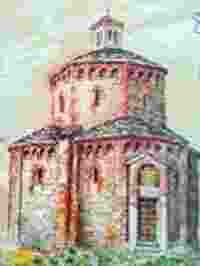Healings

Heals a man's hand
And he said to the man, "Hold out your hand". He held it out, and it returned as healthy as the other.
Join Us
Gospel - Matthew [12:9-14]
Going on from that place, he went into their synagogue, 10 and a man with a shriveled hand was there. Looking for a reason to bring charges against Jesus, they asked him, "Is it lawful to heal on the Sabbath?"
He said to them, "If any of you has a sheep and it falls into a pit on the Sabbath, will you not take hold of it and lift it out? 12 How much more valuable is a person than a sheep! Therefore it is lawful to do good on the Sabbath."
"
Then he said to the man, "Stretch out your hand." So he stretched it out and it was completely restored, just as sound as the other. But the Pharisees went out and plotted how they might kill Jesus.
Exegesis - Gospel - Matthew [12:9-14]
In the text, we find Jesus going to a synagogue, probably in Galilee. Here he meets a man with a paralyzed right hand. The scribes and Pharisees continue to observe Jesus closely and ask him: “Is it lawful to heal someone on the Sabbath?” It's a trick question, because they know well what their law prescribes; in fact the Old Testament reports that on the seventh day, the Sabbath, man must abstain from work, in memory of the God who, creating, on the seventh day stopped working (Genesis 2,2-3; Ex 20,8-11), and of the liberation from Egyptian slavery that God worked for the children of Israel.
(Dt 5,12-15).
The law stated that, on that day, it was permissible to recover only if the person was in danger of life. Now the Pharisees are launching this challenge publicly, especially since it was not the first time that Jesus violated this prescription: just think of the healing of the possessed person, of the paralytic at the pool of Bethsaida, of the born blind, all of which took place on Saturday.
The scribes and the Pharisees are furious, and with their provocative question they want to see if Jesus has the courage to contravene the prescriptions and work the miracle. Jesus responds by asking them a question in his turn: “Which one of you, if he has a sheep and this one falls into a ditch on the Sabbath day, does not grab it and pull it out?”. It is an extraordinarily clever question; in fact, a sheep represents a considerable economic investment and no one would have left it in a pit until the following day, since in the meantime it could have died causing a huge loss; furthermore, the scriptures state, “The righteous one takes care of his pets”.
(Prv 12,10).
Since it is evident that a man is worth much more than a sheep, it is therefore legitimate to do good to those who necessarily need it on the Sabbath day. In this way the religious leaders cannot object: the reasoning is flawless, they are forced to remain silent and the confrontation with Jesus becomes even more charged with tension; however Jesus does not allow himself to be intimidated and, turning to the man, he says: “Stretch out your hand”; as soon as he carries out the command, the paralyzed hand is healed. The Pharisees, furious in witnessing this healing, left the synagogue immediately began to make plans against Jesus “to get him out of the way”, conspiring with the supporters of Herod and the Sadducees, united with them in the common intent.
Jesus seems to have intentionally chosen to heal on Saturday, to highlight the contradiction of that law interpreted so “humanly” by the Pharisees and the doctors of the Temple. Jesus analyzes the Pharisaic concept of “saving a life” and enriches it with the indication of “doing good”: he puts the suffering of the creature and its consequent health, physical and interior, above everything else. For Jesus, for the Law of the Father, it is therefore lawful on the Sabbath to do good, to save a life and not to let it suffer or perish. Indeed, he came to complete the law, introducing the concept of love, charity, mercy.
The healings on the Sabbath therefore highlight the eschatological mission of Jesus, the announcement of the fulfillment of time and the advent of the Kingdom of God, bones of Salvation. The urgency that leads Jesus to heal on the Sabbath therefore does not lie in the conditions of the severity of the sick, but in the saving urgency of his mission. Jesus' healing actions on the Sabbath are nothing more than the fulfillment of God's original intention and the ultimate purpose of the Sabbath as revealed in the Old Testament: the only thing to radically refrain from on this day is the bad.
Jesus reveals the urgency of healing, because healing people who have been sick for a long time shows the messianic power of the One who heals the incurable. He, by doing this, testifies to the fulfillment of time, of redemption, of salvation, of the promised kingdom.
